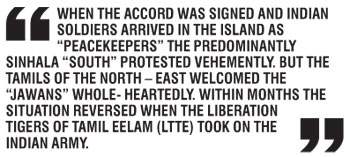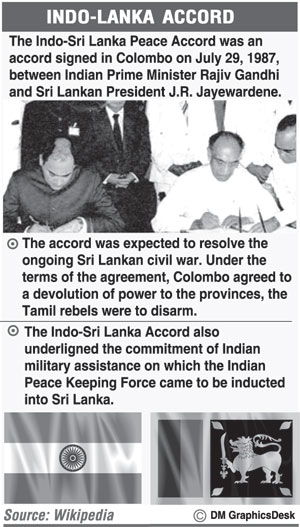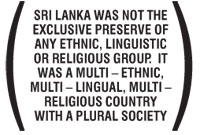Reply To:
Name - Reply Comment
Last Updated : 2024-04-19 05:45:00
 By D.B.S.JEYARAJ
By D.B.S.JEYARAJ Generally Countries act in their own self – interest but often attribute lofty motives for such actions. In the case of India vis a vis Sri Lanka there were three reasons for its conduct.
Generally Countries act in their own self – interest but often attribute lofty motives for such actions. In the case of India vis a vis Sri Lanka there were three reasons for its conduct.

 HORIZONS
HORIZONS The Indo – Lanka accord acknowledged for the first time that “Sri Lanka is a multi ethnic and multi – lingual plural society consisting inter – alia of Sinhalese, Tamils, Muslims (Moors) and Burghers”.
The Indo – Lanka accord acknowledged for the first time that “Sri Lanka is a multi ethnic and multi – lingual plural society consisting inter – alia of Sinhalese, Tamils, Muslims (Moors) and Burghers”.
 But such hopes turned into dupes. The Supreme Court ruled that the merger itself was not done legally. It did not rule out such a merger being validated through appropriate procedures.
But such hopes turned into dupes. The Supreme Court ruled that the merger itself was not done legally. It did not rule out such a merger being validated through appropriate procedures.
Add comment
Comments will be edited (grammar, spelling and slang) and authorized at the discretion of Daily Mirror online. The website also has the right not to publish selected comments.
Reply To:
Name - Reply Comment
On March 26, a couple arriving from Thailand was arrested with 88 live animal
According to villagers from Naula-Moragolla out of 105 families 80 can afford
Is the situation in Sri Lanka so grim that locals harbour hope that they coul
A recent post on social media revealed that three purple-faced langurs near t